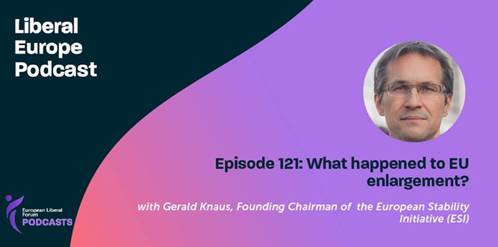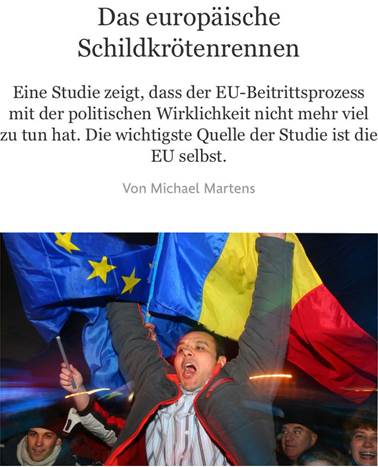Elephants in Skopje – Balkan turtle race and Ukraine
- The first elephant: a bus without wheels
- The second elephant: Bulgaria or Should Macedonians exist?
- 2019 – Borisov’s paper
- The French proposal
- The mysterious protocol
- The way out: Guarantees for Skopje
“But did you see the elephant? What did you think itlooked like?”
“Are you quite sure it’s there?”
“Quite sure.”
“Well, brother, you mustn’t be too hard upon me; but, to tell the truth, I didn’t remark the elephant.”
Ivan Krylov, 1815
Dear friends of ESI,
Yesterday, European Commission president Ursula von der Leyen visited Skopje, the capital of North Macedonia. She told members of parliament: “We want you in the EU.” 17 years after North Macedonia was declared an official candidate for EU membership, she explained, the moment had come to make real progress. And a recent French proposal offered a way to finally launch North Macedonia’s accession talks.
Russian poet Ivan Krylov once wrote a fable about a man who goes to a museum, notices all sorts of tiny things, but fails to notice an elephant. “The elephant in the room” has since come to describe big questions everyone knows about, but that no one wants to discuss openly.
On this afternoon, while von der Leyen spoke, there were two such elephants next to her in the Macedonian Parliament.
The first elephant: a bus without wheels
One big elephant in the room yesterday was the state of the EU enlargement process in the Western Balkans. Von der Leyen told MPs that by embracing the French proposal,
“… by opening this door now, North Macedonia empowers itself by being in the negotiation process rather than outside of it. And benefits will accrue as you progress. Investments, improved trade links, closer collaboration in key sectors such as energy and transport. New good jobs, business opportunities. This is what the young generation wants. They love their country. They want to build their future here. They are willing to work hard for that. But they need the opportunity. Let us open the next important door for them.”
She suggested that there was one more crucial door to open and once Macedonians would walk through it, the lives and jobs, of this and the next generation, would be transformed.
Alas, there are today already three other countries negotiating with the EU where no such transformation has taken place: Turkey (since 2005), Montenegro (2012) and Serbia (2014). A new ESI report examines why:
The Balkan Turtle Race – A warning for Ukraine
NEW ESI Report 13 July 2022
Our report analyses how the EU accession process lost its transformative power in recent years, as measured by the European Commission itself. We find that it simply does not matter anymore whether a country is outside of the process, a candidate or negotiating.
To see this, we must examine no further than the EU’s own evaluation process. In the interest of transparency, the European Commission uses five categories to track progress towards meeting EU standards in all chapters of the accession process:
Well advanced (1)
Good level of preparation (2)
Moderately prepared (3)
Some level of preparation (4)
Early stage (5)
The Commission’s annual reports show that North Macedonia, which has been blocked from opening accession talks since 2009, is as prepared today to join the EU as Serbia and Montenegro. Albania is not far behind.
October 2021 – European Commission average assessments of 33 chapters
|
Montenegro |
Serbia |
North Macedonia |
Albania |
Bosnia |
|
|
Average |
2.9 |
3.0 |
3.0 |
3.4 |
4.4 |
Albania made progress outside of the process. Montenegro made progress inside the process. Serbia (negotiating), North Macedonia (a candidate) and Bosnia (not a candidate) did not. Opening and then continuing accession talks did not make reforms more likely. And when it comes to fundamental issues such as the rule of law and human rights, North Macedonia is already ahead of Serbia today – without negotiations.
2021 – Where candidate countries stand on Rule of Law Fundamentals
|
Priority reform area |
N.Macedonia |
Montenegro |
Albania |
Serbia |
Turkey |
|
Functioning of judiciary |
3.5 |
3 |
3 |
4 |
5 |
|
Fight against corruption |
3.5 |
4 |
4 |
4 |
5 |
|
Fight against organised crime |
4 |
3.5 |
4 |
4 |
4 |
|
Freedom of expression |
3.5 |
4 |
3.5 |
4 |
5 |
|
Total |
14.5 |
14.5 |
14.5 |
16 |
19 |
At the same time Turkey, the country that has negotiated the longest with the EU, has the worst level of preparation on fundamentals among all candidates today, and is backsliding. Is this the future of Balkan accession negotiations: the longer they go on, the less impact they have?
Commission assessment of Turkey – “Rule of Law Fundamentals”
|
Priority reform area |
2015 |
2019 |
2020 |
2021 |
|
Functioning of judiciary |
4 |
5 |
5 |
5 |
|
Fight against corruption |
4 |
5 |
5 |
5 |
|
Fight against organised crime |
4 |
4 |
4 |
4 |
|
Freedom of expression |
4 |
5 |
5 |
5 |
|
Total |
16 |
19 |
19 |
19 |
All this raises fundamental questions: what has been the point of eight years of accession negotiations with Serbia and ten years with Montenegro if a neighbouring country that never opened such negotiations is as prepared for accession as they are? And will these negotiations ever end?
Far from North Macedonia being an outlier, all Western Balkan states are stuck. Their accession process resembles a bus without wheels, with North Macedonia discussing conditions for moving up a row of seats inside a vehicle going nowhere.
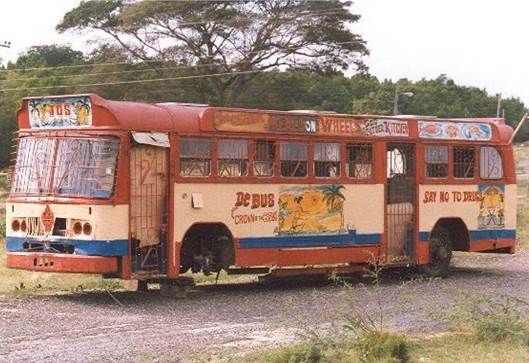
The state of the EU accession process today
Length of EU accession talks (till end of June 2022)
|
Country |
Length |
Status |
|
Latvia, Lithuania, Slovakia |
34 months |
Completed |
|
Estonia, Poland, Slovenia |
56 months |
Completed |
|
Bulgaria, Romania |
58 months |
Completed |
|
Croatia |
68 months |
Completed |
|
Serbia |
101 months |
closed 2 chapters |
|
Montenegro |
120 months |
closed 3 chapters |
|
Turkey |
200 months |
closed 1 chapter |
It is time for the EU to acknowledge this reality and take action.
The second elephant: Bulgaria or Should Macedonians exist?
The second big elephant which Ursula von der Leyen did not mention even once during her speech was the only reason she had to come to Skopje: Bulgaria.
For years now Bulgarian governments and parliaments have insisted that ethnic Macedonian identity was based on identity-theft, which must end before North Macedonia can join the EU. On this, all von der Leyen had to say was:
“Bilateral issues, such as history issues, are not conditions for accession. There can be no doubt that Macedonian is your language.”
And yet, by ignoring the obvious, von der Leyen resembled the man in Krylov’s tale: for Bulgaria, history remains the central condition for North Macedonia’s accession. With the French proposal von der Leyen recommended, history was about to become a condition for the whole EU.

Two elephants in Skopje
Bulgarian leaders do not dispute that there are people in the world today who consider themselves ethnic Macedonians. There are obviously many. The dispute is about where these people come from, their past and their future as Macedonians. And about a policy to transform those who think of themselves today as ethnic Macedonians back into Bulgarians through pressure (vetoes) and incentives (Bulgarian passports).
Bulgaria makes it easy for ethnic Macedonians to obtain Bulgarian passports, which offer all the advantages of EU membership. It then insists that those with two passports are considered a Bulgarian minority in North Macedonia … a minority likely to grow, the longer North Macedonia is stuck. This minority, Bulgaria insists, must be included in the constitution, something which has now become a pre-condition of the EU to launch the accession process with North Macedonia.
Bulgaria will push to ensure that this group obtains rights and privileges, including its education in Bulgarian. A steady transformation of ethnic Macedonians into Bulgarians will then be further accelerated through changes in culture and education: children in schools in North Macedonia should be taught that their grandparents were in fact Bulgarians. They should learn that a few decades ago authoritarian leaders misled, hypnotized, manipulated and terrorized these Bulgarians. They should understand that when the Bulgarian army, allied to the Third Reich, occupied North Macedonia during the Second World War it was not an occupation force but a force for good (how can one occupy one’s compatriots?).
Bulgarian governments strongly insist today that there can be no self-identified Macedonians in any other state, outside the control of Skopje authorities. There can only be a Bulgarian (not Macedonian) minority in Albania. There can only be Bulgarians living in Bulgaria. Anyone who feels ethnic Macedonian outside of North Macedonia is attacked as deluded. In Bulgaria organisations of ethnic Macedonians are dissolved. Judgements by the European Court of Human Rights that this is a violation of their rights are ignored.
But if there can be no self-identified ethnic Macedonians outside North Macedonia, why are there then self-identified Macedonians inside in the country? The answer given by most leaders and parliamentarians in Bulgaria is clear: this is the result of criminal communist manipulation launched in 1944. Those who were terrorized in 1944 to think of themselves as Macedonian-speaking Macedonians had been Bulgarian-speaking Bulgarians, just as their fathers and grandfathers had been. Without this there would be no Macedonians today even inside North Macedonia.
But now Bulgarian leaders have reason for hope. And they have found the perfect tool to help their truth prevail: the desire of Macedonian citizens to join the EU.
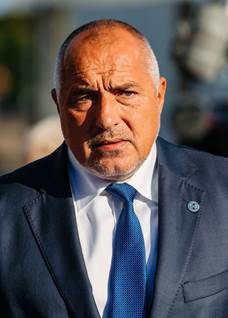
2019 – Borisov’s paper
And thus, on 9 October 2019, a government led by Boyko Borisov, the most successful Bulgarian politician of his generation and three-time prime minister, presented his government’s position on Macedonia to other EU governments, explaining that Bulgaria had no choice but to stop “the European legitimisation of a state-sponsored ideology on an anti-Bulgarian basis” through vetoes.
His government set out its case in an extraordinary paper. This paper explains that the heart of Macedonia’s anti-Bulgarian “ideology” is the claim that there were ethnic Macedonians before 1944, when there were only Bulgarians. It warned: “The rewriting of the history of part of the Bulgarian people after 1944 is among the pillars of the anti-Bulgarian ideological construction of Yugoslav totalitarianism.”
But the paper also charts a path to address this problem. A 2017 Treaty on Friendship and Good Neighbourliness between Bulgaria and North Macedonia could be “a solid legal basis for good neighborly relations”; it “was expected to solve the problems that have been layered over decades”, but it had not done this yet. Bulgaria would therefore now demand “the strict and full implementation of the letter and spirit” of this treaty:
“Bulgaria will insist that the text of the conclusions of the General Affairs Council [meeting of EU foreign ministers] on 15 October 2019 should reflect unequivocally that the implementation of the Neighbourhood Treaty will form part of the conditionality applicable in the membership negotiations.”
The Borisov paper then zooms in on its key concern: history.
“Bulgaria’s agreement to hold the first IGC [Intergovernmental conference on accession] will be conditional on real progress in implementing the letter and spirit of the Treaty of Friendship … including with regard to the activities of the Joint Expert Commission on Historical and Educational Issues.”
But what does “real progress” mean in meetings of academic historians who share their findings and discuss different interpretations of the past? It means “results” verified by politicians:
“Achieving concrete results in the work of the Commission, verified by the Joint Intergovernmental Commission [chaired by the two foreign ministers] on the period of our common history up to 1944, including reaching agreement on Goce Delchev, VMORO-VMRO and the Ilinden-Preobrazhensky Uprising.”
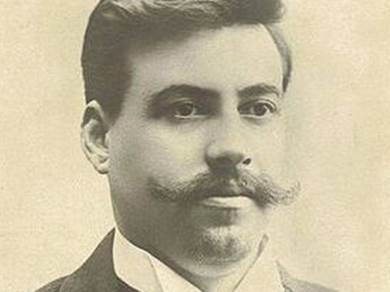
“Who am I?” – the next issue at EU Council meetings
Non-experts on Balkan history might find these details confusing, but the gist of this position is easily understood: “concrete results” require that Macedonian historians admit that their ancestors and their heroes leading their political movements before 1944 were Bulgarians who worked for the unity of Bulgarians. While “implementation” requires that once historians “agree” on this Bulgarian version of events, both governments ensure that this will be the only version of history that people will learn or hear about. This will require concrete steps:
“– replacement of information signs and other markings, including on historical monuments and cultural monuments, in implementation of the texts agreed so far;
– agreeing on specific dates for the general commemoration of the events and personalities agreed upon;
– when commemorating events and personalities on which agreement has been reached, political figures, representatives of state institutions in the Republic of North Macedonia, as well as the media funded from the state budget, to base their official statements and comments on the texts agreed by the Commission.”
In addition, the Bulgarian government sent a non-public Explanatory Memorandum to EU member states in October 2019. There it elaborated on the historical truth it was trying to establish:
“The accession path of the Republic of North Macedonia provides a valuable opportunity for its leadership to break with the ideological legacy and practices of communist Yugoslavia. The enlargement project must not legitimize the ethnic and linguistic engineering that has taken place under former authoritarian regimes …
Following WWII the Yugoslav communist leader Josip Broz Tito resorted to enforcing yet another new identity, this time ‘Macedonian’ … Tito’s project was implemented through the fabrication of a new historical narrative that would lay the foundation for this new ‘Macedonian’ concept aimed at supplanting the traditional Bulgarian identity by a regional one. It would be built at the expense of neighbouring countries’ history and geography.”
The memorandum adds that Bulgaria has “never disputed the right to self-identification of the citizens of the Republic of North Macedonia, especially taking into consideration that several generations have now been raised under Yugoslav propaganda.” However, this propaganda must now end.
In short, Borisov’s October 2019 position paper is both clear and radical. In five steps, it outlines how “problems that have been layered over decades”, resulting from the 1944 anti-Bulgarian crime of stealing Bulgarian history, will now be overcome:
1. For North Macedonia to move on its EU path, it must be a “good neighbour”, which …
2. … requires “strict and full implementation” of a Friendship treaty, which in turn …
3. … requires “real progress” in the History and Education commission, which …
4. … means that historians agree on the correct (Bulgarian) version of history and then …
5. … politicians must ensure that this is the only version presented to students and the public.
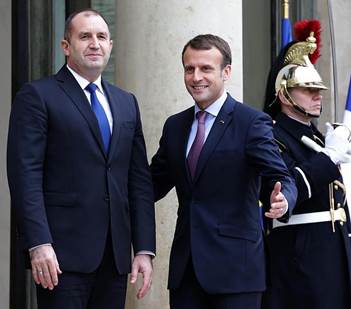
Two presidents: Rumen Radev and Emmanuel Macron
The French proposal
Now fast forward to 2022.
By mid-2022, the situation had become an acute embarrassment to the EU, and a compromise had to be found. After 2019, Bulgaria stuck to its guns and wielded its veto. Some members of the European Union grew worried that this might go on forever. So did Macedonian leaders.
Then a French proposal emerged in the very late stages of the French EU presidency. It is an attempt to square the circle. Alas, it ended up as a capitulation to the Bulgarian project outlined in the October 2019 paper, thinly camouflaged.
The most discussed aspect of the French proposal requires North Macedonia to change its constitution and to include Bulgarians as an ethnic minority in the Macedonian constitution. This will require a two-thirds majority. In return for this, the French paper proposes to hold a first meeting of the Intergovernmental Conference (IGC), which is simply a first meeting in Brussels as part of the accession process. And to hold a second meeting later once constitutional changes have been adopted by North Macedonia.
And that is it. There are no guarantees that after this Bulgaria will not veto the next meeting of the IGC, or the opening or closing of any chapter. There are no guarantees that it will not take North Macedonia as long as it took Montenegro to open all of its chapters (almost a decade). There are, of course, no guarantees that North Macedonia will ever join the EU.
And what happened to the priorities defined in the Borisov October 2019 paper and its focus on history and identity? Here the French proposal performs an acrobatic dance on the back of an invisible elephant.
There are three documents which constitute the proposal, all to be adopted by all member states.
There are, first, draft Council Conclusions. These refer to
“the importance of achieving tangible results and implementing in good faith bilateral agreements, including the … Treaty of Friendship, Good Neighbourliness and Cooperation with Bulgaria.
To explain what tangible results in implementation means, the Council points to an important recent agreement between North Macedonia and Bulgaria:
“the protocol from the second meeting of the Joint Intergovernmental Commission [chaired by foreign ministers] established under article 12 of this [Friendship] Treaty. This important step will contribute to the good neighbourly relations and regional cooperation, which remain essential elements of the enlargement process.”
This mysterious second protocol is mentioned in all EU documents. It appears in near identical wording in the second document, the draft EU opening statement prepared for the first IGC:
“In this regard, we welcome the agreement on the protocol from the second meeting of the Joint Intergovernmental Commission established under article 12 of this Treaty. This important step will contribute to the good neighbourly relations and regional cooperation, which remain essential elements of the enlargement process.”
It is also included in the third document, the EU Negotiating Framework for accession negotiations with North Macedonia, which notes that “progress will be measured in particular against the following requirements”:
… “North Macedonia’s commitment to good neighbourly relations and closer regional cooperation, including through achieving tangible results and implementing in good faith bilateral agreements, including … the Treaty on Good Neighbourly Relations with Bulgaria of 2017 as well as the annual reviews [the protocol] and measures for its effective implementation under its Article 12.”
And then there is this firm commitment in the EU Negotiating Framework:
“The Commission will give special attention to North Macedonia’s commitments to good neighbourly relations and regional cooperation … The Council will take this assessment into account when deciding on further steps relating to the negotiations on the respective chapter or cluster.”
Thus, the EU proposes that there need to be tangible results from the Treaty on Good Neighbourly Relations with Bulgaria or no further steps can be taken. It accepts that the meaning of “tangible results” is defined in a bilateral protocol which nobody has seen so far, not even, it appears, EU leaders like Ursula von der Leyen, calling on Macedonians to accept the French proposal.
The mysterious protocol
Bulgarian leaders insisted in recent months that for them this bilateral protocol was key. As an article by BIRN in October 2021 noted:
“A new round of consultations between Skopje and Sofia has been announced based on a ‘protocol’ of six Bulgarian demands – some of which the former could find hard to fulfil. The new round of talks will be based on a bilateral protocol that contains six points of contention, where Sofia will demand concessions from Skopje, as well as firm guarantees that it will stick to them.”
BIRN also examined the points mentioned by Sofia as a “must” for Skopje, including the results emerging from the work of the History Commission:
“… since 2020, when Bulgaria’s pressure against North Macedonia intensified, culminating in the EU accession talks blockade, the commission has not made progress. While Bulgaria accuses North Macedonia of not being willing to accept historical facts, Skopje insists that the original friendship treaty said the experts should be left to settle such matters on their own, without pressure.
Although far from being the only problem, the focal point in this dispute is the ethnicity and identity of the Ottoman-era revolutionary Goce Delcev, who both sides claim as their national hero.… if Bulgaria insists that the term ‘intensifying’ work means that Skopje has to abide to certain deadlines to reach acceptable definitions on the ethnicity of Delcev, for example, it would be hard to swallow for Skopje, which insists that historians must not work under political pressure”.
This was a priority for Sofia. Is it also one under the second bilateral protocol? Will the historians in the commission come under pressure to produce concrete results quickly?
Bulgarian president Rumen Radev was very clear in public that nothing was more important for his country than this protocol:
“We would not have received the French proposal, which is the best so far, if Bulgaria had not vetoed two enlargement councils last year with a clear position and argument …
The issue of the rights of Macedonian Bulgarians is already in the negotiating framework. Bulgarian politicians should not rush to declare a historic victory, because the change in the constitution is not a victory, but a step on the path to integration. The real protection of the Bulgarian interests, of our cultural and historical heritage, of the rehabilitation of the victims and the termination of the process of demoralization, depends on the content of the bilateral protocol.“
This protocol, according to Radev, needed to include “actions, mechanisms and deadlines and criteria.”
Does it? By the end of June nobody knew for sure. By the time of von der Leyen’s visit in July, the bilateral protocol was still not public.
A version leaked to Deutsche Welle on 1 July suggests however that Bulgaria won. There are no changes to make the work of the commission more objective. Instead, the leaked version of the protocol insists that the historians in the commission produce results, fast:
“During the reporting period, the Commission held (number of) meetings. Despite the little progress achieved for King Samuel and the issue of the Bogomil heresy, the Commission did not accept other recommendations, which is considered unsatisfactory.
Both sides encourage the Commission to intensify its activities and achieve clear results, in accordance with Art. 8 paragraph 2 of the Agreement …”
The Commission is to sharply increase its output: “The joint multidisciplinary expert commission on historical and educational issues will develop and implement a work plan that foresees between 8 and 10 meetings per year.”
There is a neo-colonial ring to passages like this:
“The Government of the Republic of North Macedonia to deliver to the Republic of Bulgaria copies of all methodological guidelines, textbooks, teaching aids and other relevant teaching materials in the educational program of the Republic of North Macedonia in accordance with Article 12 of the Program between the Government of the Republic of Bulgaria and the Government of the Republic of North Macedonia for cooperation in the field of education and science.”
This is not the tone of academic debates in open societies:
“Both countries should include in the curricula, textbooks and relevant teaching materials, inscriptions on monuments, plaques, information materials in museums and other locations of educational and cultural importance, as well as relevant information in publicly owned electronic information media, within two years. all already mutually agreed results of the work of the Commission, according to art. 8 paragraph 2 of the Agreement.”
For now, nobody knows more, as the bilateral protocol was not shared with the Macedonian public or even MPs. Why? Could it be that now the following has also become EU policy:
1. For North Macedonia to move on its EU path, it must be a “good neighbour”, which …
2. … requires “strict and full implementation” of a Friendship treaty, which in turn …
3. … requires “real progress” in the History and Education commission, which …
4. … means that historians agree on one (Bulgarian) version of history and then …
5. … politicians must ensure that this is the only version presented to students and the public.
The way out: Guarantees for Skopje
According to the French proposal, North Macedonia will only make progress on its accession path by passing constitutional changes requiring a two-thirds majority.
Last summer, the biggest Macedonian opposition party defined red lines for negotiations with Bulgaria. It suggested a resolution, which proposed that any negotiations with Bulgaria should be led “on an equal and principled basis, without any conditioning … and with respect to the dignity of the Macedonian people.” And it warned that any talks should be based on “unequivocal respect” for the “autochthony of the Macedonian nation, its historical, linguistic, cultural and religious continuity.”
Yesterday in Skopje, Ursula von der Leyen declared that “bilateral issues, such as history issues, are not conditions for accession.”
This suggests that the European Commission also sees this as a red line. But does the Council? And how could a two-thirds majority including the opposition be found in Skopje for constitutional changes without this being clarified first?
One way forward now would be to define clear guarantees. Three come to mind:
– a clear link between the date when the constitutional changes demanded by Bulgaria enter into force and concrete benefits and results to be delivered by the EU. In this way, Bulgarian governments would have an interest in North Macedonia’s progress, and not the reverse. The constitutional changes could be as follows:
“Bulgarians will become a recognized minority in North Macedonia. This provision enters into force the moment when [all chapters are opened? Macedonian citizens enjoy the four freedoms? North Macedonia becomes an EU member?].
– a clear statement by the European Council that the debates and results in the historical commission must not and will not become conditions for progress in the accession negotiations.
– a refusal by serious historians from both North Macedonia and Bulgaria to take part in any abuse of academic history, boycotting the commission unless the academic freedom of the commissioners is guaranteed. Historical commissions can work, but not as stages for nationalist political theatre. The best way forward would be for competent historians from other countries, selected by UNESCO and the Council of Europe, to be appointed as well.
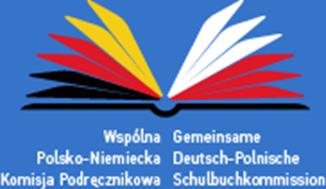
HERE more: German-Polish textbook commission, operating since 1972
Unless this is clarified, we will soon see Academies of Sciences and foreign ministries in other countries drawing up “historical conditions” to be met by their neighbours who aspire to join the EU. This has already started to happen in Zagreb.
That would be like a fire breaking out in the bus without wheels: even the most patient passengers would then rush to get out. It is not a fire that the EU can allow to get out of control.
Your sincerely,
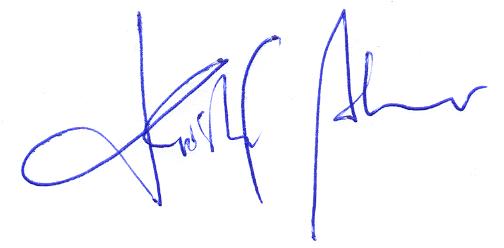 |
||
|
Gerald Knaus |
Kristof Bender |

Gerald Knaus
NEW 13 July 2022
ESI Report – Balkan turtle race – a warning for Ukraine – on Montenegro


Excerpt – Balkan turtle race
North Macedonia has been a member of the Council of Europe since 1995, a member of NATO since March 2020 and an official candidate for EU accession since 2005. North Macedonia has been stuck due to a series of bilateral vetoes by different member states: Greece, France, now Bulgaria. The EU also expects that it will take North Macedonia many more years to open all negotiating chapters. Few point out how absurd this is. According to the European Commission’s own assessments of preparedness, North Macedonia is today already as prepared or better prepared in 23 of 33 chapters than Montenegro which has already opened all chapters. Why this difference?
Montenegro has been a member of the Council of Europe since 2007, following its independence in May 2006. It is in NATO since 2017 and has been negotiating accession with the EU since June 2012. Over a decade later, the EU is still not prepared to say that it might be ready for Montenegro to become the 28th member state by some fixed date (January 2026? January 2027?) if it met all criteria. The EU did so in previous enlargements. Why not now?
One way to reenergize the accession process immediately is for the EU to show that it is still possible for countries that meet membership criteria, as objectively assessed by the European Commission, to become members. The Council could declare in 2022 that it is getting ready for Montenegro, the most advanced candidate with the longest positive track record, to become a member by early 2026, if it meets the criteria.
Montenegro has some 620,000 inhabitants. It is so small that its accession would cost the EU very little. As the EU already had 28 members until the UK left, there is no need to change any EU institutions first. Montenegro has no problems with its neighbours. Its many minorities are treated well. In fact, no ethnic group or nation constitutes an absolute majority among Montenegro’s population. Multi-ethnic parties are the rule rather than the exception. Its track record in the implementation of rulings of the European Court of Human Rights is strong. In the Reporters Without Borders index (2022) Montenegro ranks 63 of 180 countries, ahead of six EU member states: Cyprus, Poland, Malta, Hungary, Bulgaria, Greece.
In 1999, Montenegro took in tens of thousands of Kosovar refugees. In 2008, it recognized Kosovo’s independence. From 2010 to 2014, it supported the NATO-led operation in Afghanistan and later the follow-on mission to train and assist the Afghan security forces. Montenegro has been a loyal member of NATO for more than five years. In 2022, it supported EU sanctions against Russia. A few weeks ago, in June 2022, Charles Michel, the president of the European Council, explained in Podgorica:
“Montenegro has been a consistent partner for the EU over many years. In fact, for more than a decade, Montenegro has a 100% record of aligning with our common foreign and security policy. This shows your strong commitment to becoming a member of the EU. And with your new government … now is the time to speed up your integration with the EU.”
At the same time the European Union could send a strong signal to the whole region: any European democracy that meets the criteria, including respect for human rights and the rule of law, as assessed by the European Commission in its annual reports, should gain access to the European Single Market and to the four freedoms – the free movement of goods, people, services and capital. Its citizens and businesses would thus enjoy many of the same rights as those from EU members or Norway and Iceland enjoy today. With this step, the assessments of progress – merit” – would immediately matter once again.
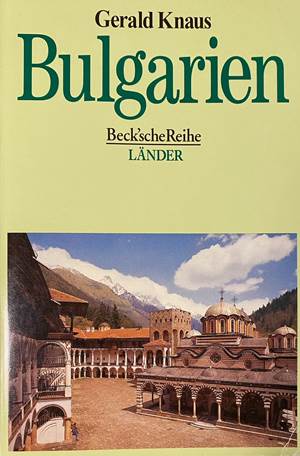
This is not a new dispute – analysis in German in 1996
Further reading
Frankfurter Allgemeine Zeitung, Das europäische Schildkrötenrennen (“The European Turtle Race”), 16 July 2022
Radio Television of Serbia, Da li reforma EU ide naruku zemljama Zapadnog Balkana ili radi protiv njih (“Does reform of the EU help countries of the Western Balkans or does it work against them?”), TV interview with Adnan Cerimagic, 13 July 2022
Liberal Forum, What happened to EU enlargement with Gerald Knaus, Podcast with Gerald Knaus, 8 July 2022
TV Alfa Emisii, ЗАСПИЈ АКО МОЖЕШ (“Sleep as well as you can”), TV interview with Gerald Knaus, 27 June 2022
Süddeutsche Zeitung, Wehe, es geht los (“It better not start”), Guest commentary by Gerald Knaus, 17 June 2022
The European Stability Initiative is being supported by Stiftung Mercator

